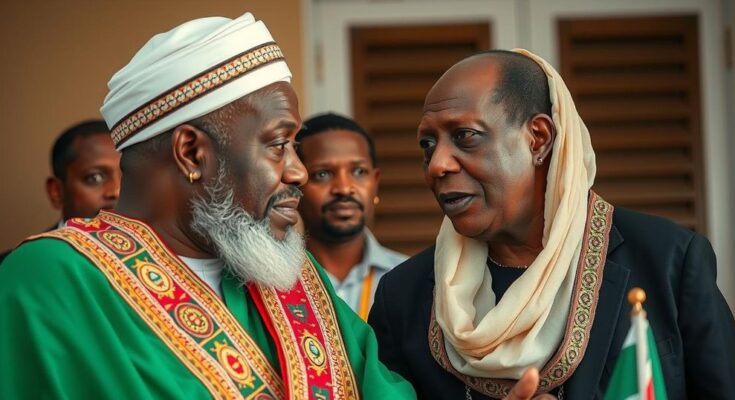General Assimi Goïta of Mali hosted Sudan’s leader Abdel Fattah al-Burhan amid military challenges in both nations. Goïta’s rule followed a coup that ousted President Keïta, while Burhan faces conflict from rival forces in Sudan. Their meeting reflects a broader shift towards alliances with Russia, moving away from traditional ties with France.
On Saturday, General Assimi Goïta, the head of Mali’s governing junta, hosted a meeting with Sudan’s de facto leader, Abdel Fattah al-Burhan. This engagement comes amid significant military challenges both leaders face within their respective nations. General Goïta greeted al-Burhan upon his arrival for a two-day visit, as confirmed by a statement from the Malian presidency shared through social media channels.
General Goïta came to prominence after orchestrating a coup in 2020 that toppled the democratically elected president, Ibrahim Boubacar Keïta. Similarly, Burhan took control in 2021 by removing civilian officials from a government structure that emerged following the 2019 ousting of the long-standing dictator Omar al-Bashir. Presently, Sudan is embroiled in conflict, exacerbated by tensions between Burhan’s military forces and the Rapid Support Forces (RSF), led by his former deputy, General Mohamed Hamdan Daglo, commonly referred to as Hemedti.
While the Malian presidency indicated there would be extensive interactions between the two leaders throughout the visit, no specific activities were disclosed. Since the coup in Mali, the government has fostered a departure from traditional alliances, particularly distancing itself from France, the former colonial power. Instead, Mali has sought closer ties with Russia and the Wagner paramilitary group. Likewise, Sudan has been bolstering its relationship with Russia, though Moscow’s current reassessment of support for the RSF poses a risk to its strategic military interests in Syria.
In addition to his discussions with General Goïta, Burhan has a scheduled visit to Guinea-Bissau on Sunday and Monday. This event unfolds as both leaders navigate complex domestic issues and rethink their international alliances, particularly with Russia, amid their respective military crises.
The meeting between General Assimi Goïta of Mali and Abdel Fattah al-Burhan of Sudan highlights the current political instability faced by both nations. General Goïta’s rise to power stemmed from a coup in Mali that dismantled the existing government, while General Burhan has been navigating the repercussions of conflict ignited by internal power struggles, notably with his deputy. Additionally, both leaders have pivoted towards establishing connections with Russia, reflecting a significant shift in their foreign policy from previous Western affiliations, particularly with France. The context of their discussions is enriched by the broader geopolitical landscape, particularly regarding the increasing tensions involving Russia and its military support strategies, not only in Africa but across various conflict zones globally.
In summary, the visit of General Abdel Fattah al-Burhan to Mali to confer with General Assimi Goïta serves as a significant indicator of the shifting political dynamics within both Sudan and Mali. Both leaders must contend with internal military challenges and are realigning their international partnerships, particularly with Russia. As they navigate these complex issues, the outcomes of their discussions could potentially influence the stability of their nations as well as the region’s geopolitical balance.
Original Source: newscentral.africa




